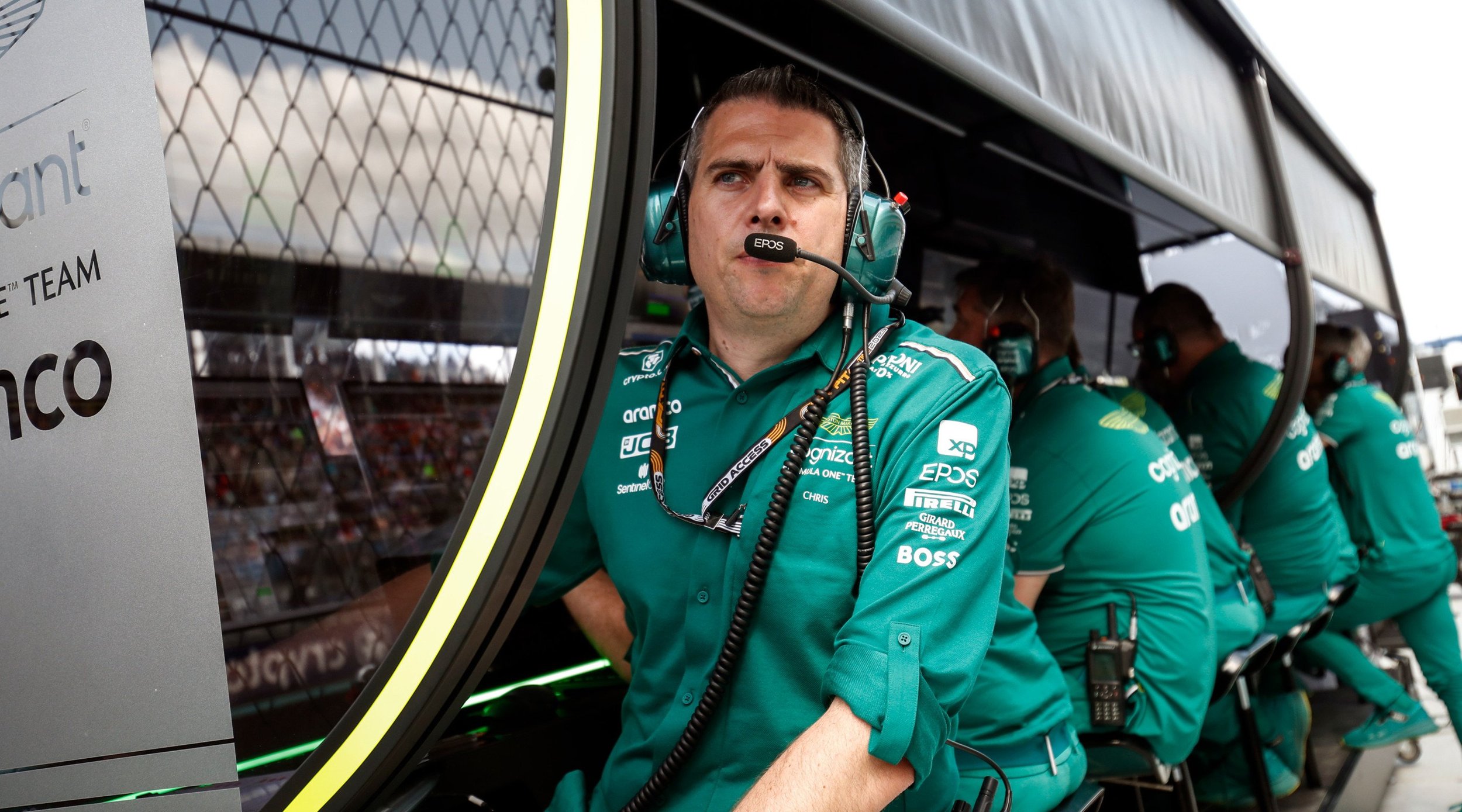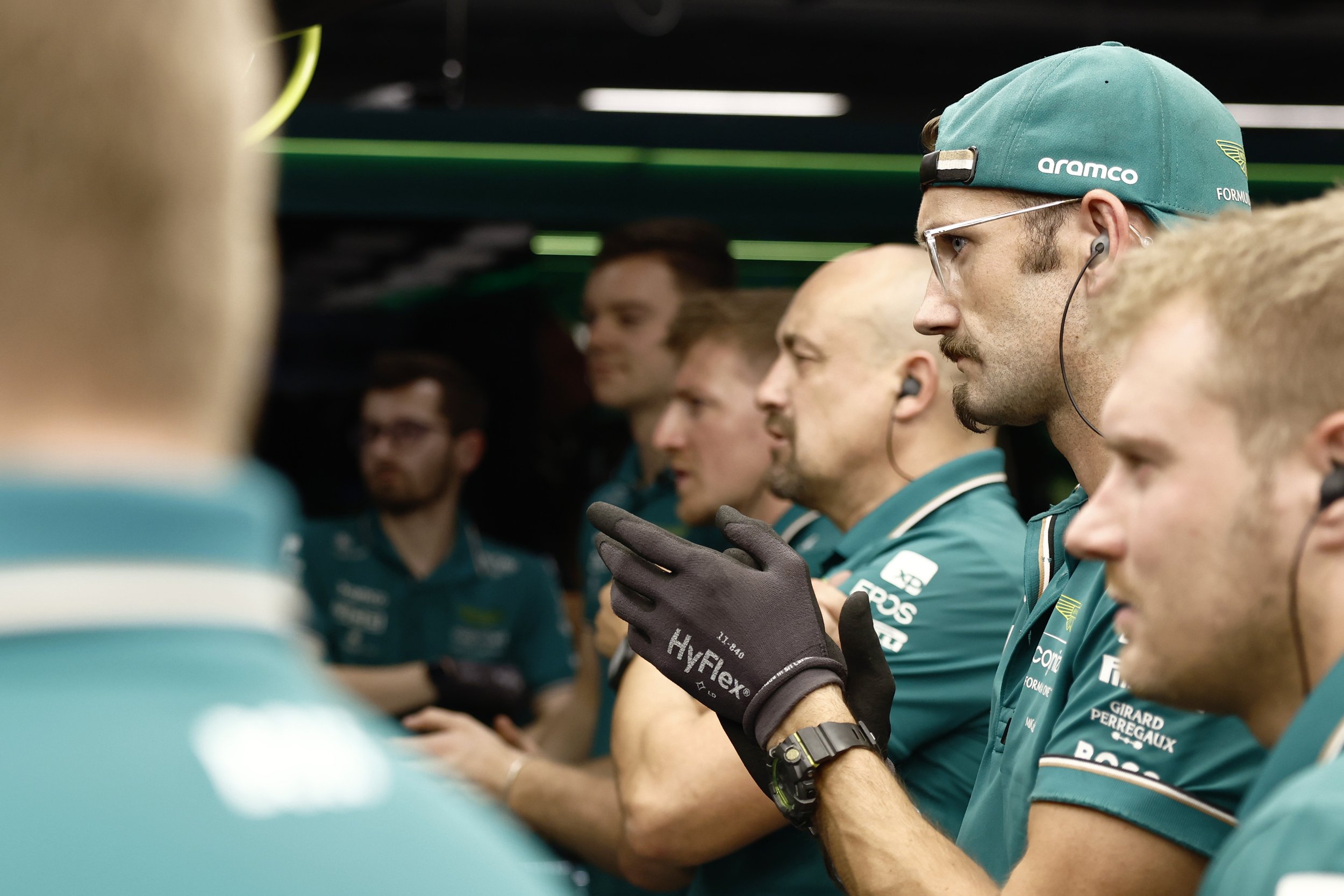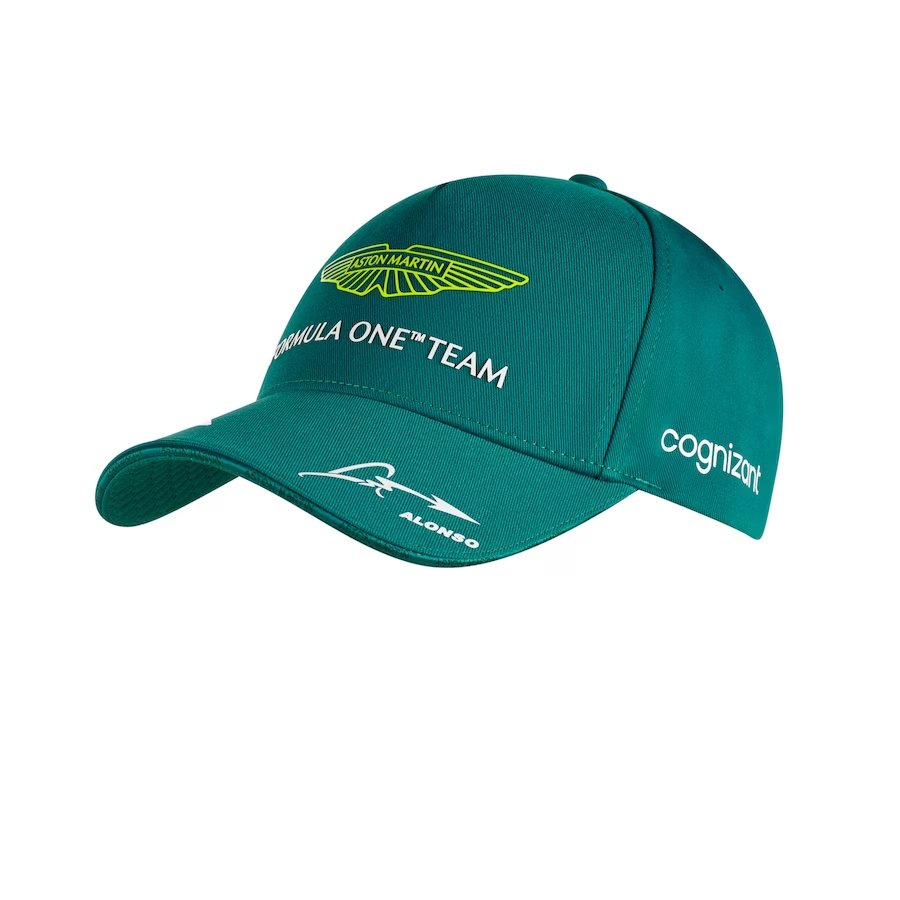Getting to Know: Aston Martin F1 Team Race Engineers Ben Michell and Chris Cronin

In the heat of battle on track, Aston Martin F1 Team Race Engineers Ben Michell and Chris Cronin filter out the noise and convey essential information to Lance and Fernando. We reveal how in this illuminating interview presented by our Official Trading Partner AvaTrade.
They're in the driver's ear, they're a second pair of eyes, they're the bridge between the driver and the team; a race engineer is responsible for extracting performance out of the car and the driver. At Aston Martin F1 Team, Ben Michell and Chris Cronin are charged with this responsibility for Lance Stroll and Fernando Alonso, respectively.
You will have heard them transmitting important messages over team radio during Grands Prix and you will have almost certainly seen them on the pitwall. We caught up with the pair to learn more about what it takes to be a race engineer and how to manage the mind of an F1 driver.
"A large part of our job is to be the link between the data fed to us from the team at the AMR Technology Campus to the driver – deciding what information we pass onto the drivers, as well as when and how to communicate it," explains Chris.
"There's a lot we say to the drivers during the race, that you'll never hear on the live broadcast," says Ben. "They just take snippets of team radio and sometimes the context is totally different – but it's part of the show, and you've got to accept it.
“A lot of what doesn't get broadcast is mundane stuff like switch changes, which may not be compelling listening but it is important – and we do listen to other teams discussing things like this over team radio."
"We can hear everything that's broadcast to the other cars, between the drivers and engineers," adds Chris. "After a Grand Prix, we end up with about a 15-minute audio file from every driver and race engineer pairing from which we can pick out switch changes and codes and get a better understanding of their approach and strategy.”
The recent São Paulo Grand Prix, in which Fernando took his eighth podium of the season, provided an opportunity to hear how race engineer and driver work in tandem to secure the best result possible in the heat of battle. From Lap 55 to the very end of the race, Fernando and Sergio Pérez were split by less than a second – with Fernando ultimately crossing the finish line just 0.053s ahead.
Dialling in
Training for this job isn't straightforward. Ben and Chris listen to other race engineers and their drivers to get a better understanding of how our rivals communicate, but they also listen to audio between fighter pilots and their handlers during aerial dogfights to learn how to communicate with maximum clarity and precision. It's one of the few situations that is comparable to their own.
Effective communication relies on trust. Trust, however, takes time to build – a luxury neither Ben nor Lance had. Chris had little more than two months working with Fernando before the season-opening Bahrain Grand Prix and Ben was parachuted into the role of Lance's race engineer in the latter half of the 2021 season.
“The first three to six months of building up the relationship and understanding between you, working out how you can help each other to do the best job possible, is one of the most challenging periods,” says Chris.
“You're trying, as quickly as possible, to get to a point where you're only giving them information that's really going to help them, that's going to make a difference – that's going to make them go faster. There's a lot of peripheral stuff that a driver might think they need to know, but they don't. It just dilutes the information they need to focus on.”
Experience helps accelerate this process. Fernando joined the team as the most experienced driver on the grid – a double World Champion and veteran of 355 Grands Prix – and this helped him hit the ground running with Chris.
"When Fernando arrived, he immediately said, 'This is the sort of thing that I like and this is what helps me go fast.' Having this kind of direction shortcuts the familiarization process, whereas with younger drivers it might take a bit more time to find out what they need," explains Chris.
Trust, however, extends beyond the relationship between the race engineer and the driver, and it is essential between the race engineer and the rest of the team. The reality is you cannot go it alone, as Ben explains reflecting on making the switch from senior performance engineer to race engineer: "It was almost a bit of a shock going straight into being Lance's engineer," says Ben.
"We had to go straight into racing. I've been in other roles, important roles, both trackside and in Mission Control, but roles where there isn't the same time pressure as there is being a race engineer.
"You quickly realize that you can't do the job on your own.
"To be a good race engineer, you need to draw on the support, skill, and time of those around you. You're part of a team and there are lots of people around you who can focus on specific things.
"As a race engineer, you don't have the time to focus in detail on every area. Instead, you've got to trust your teammates to give you the information and then be the conduit for that information to the driver.
"If you try to do everything yourself it's not efficient and you will burn yourself out. It's a privilege to be the person at the head of that flow of information, providing it to the driver, but if you try to do it all on your own it will go wrong."
Taking a step back
In a sport as complex as Formula One, there is plenty that can go wrong, and in the preliminaries of a Grand Prix, there is plenty of time to think about what can go wrong. The countdown to the race start can feel like an eternity, when the noise of the crowd, roaming broadcasters, guests, and thumping music dominates the build-up to lights out. It's this period where Ben and Chris step back.
"You have to trust that the car and the strategy are in the right place. The grid is not the place to start doubting or changing those," says Chris.
"You could end up discussing and changing plans if you're not careful so, other than a quick final check of a few key details and settings, I leave Fernando alone to do his bit on the grid. We have all our pre-race meetings over two hours before the race. For those final two hours, he's on his own, or with his trainer maybe, doing the pre-race rituals that are important to him and focusing on the task at hand.
"The main thing Fernando wants from me and the team is to have the plan sorted, and to have gone through and planned for as many of the potential scenarios – the what ifs."
Lance shares this trait with Fernando, reveals Ben: "On the grid, Lance doesn't want to talk a lot – he just wants to focus. He's preparing himself and he doesn’t want a lot of discussion coming into the race.
"There’s almost too much time now in the build-up to a race. If you weren't confident, you would fill it with doubts and could end up expressing those doubts – there's a very real risk of putting the driver in the wrong mindset for the start of the race.
"Sometimes it is a real challenge to take a step back to let them get in the zone and prepare mentally – but the best way to do that is to give them space to get in the right mindset, either by themself or with their trainer."
Keeping calm
The key to effective communication with drivers is simplicity – filtering out the terabytes of data and all the minutiae that have informed a strategy call – but when drivers are under pressure, jockeying for position or wrestling with a car that’s proving difficult to drive, communication threatens to become fraught with tension.
"You want the information or advice you're communicating to be taken on board by the driver, and taken the right way, but in the heat of the moment sometimes it's not – and that's understandable," says Ben.
"They may be exceptional athletes, but the drivers are still human – emotions can boil to the surface. That's part of what makes the sport so compelling. What matters is how you manage your emotions in those high-pressure situations. Qualifying is when you see this most often. Drivers have to exhibit a lot of mental strength: if they've made a mistake or not nailed a lap, they have to be able to quickly put it out of their mind, not dwell on it, and go out there again and deliver the next lap.
"It's OK to show emotion, but it's better to do this after the session – after you've looked at the data to try to understand what happened and the reasons for it. More often than not, once you’ve started to break things down and begun to make sense of things, it tends to take the heat out of the situation."
Staying focused
Although they're not behind the wheel, race engineers are subject to the immense pressure that comes with competing at the pinnacle of motorsport. Every decision and its resulting success or failure is scrutinized to a microscopic degree – there is no hiding place when there are millions of eyes watching.
"Drivers must be resilient; they need to have a water-off-a-duck's-back mentality because there are so many outside forces that can gnaw away at your confidence and belief,” says Chris.
"It's the same for us as race engineers: I tend to avoid social media and barely look at F1 news to shield myself from external pressures.
"This has become more and more of a thing in the last few years," adds Ben. "People will dissect an event without all the facts, without understanding the context."
The journey, not the destination
The focus on the result or the outcome of the most recent race can all too often cloud the bigger picture. Formula One is inherently results-driven, but Ben and Chris both agree that the result is only part of the story and that what matters is how you get there – the process – as we continue our journey to build a race-winning team.
"You can't do our job well if you're only interested in standing on the podium, winning a race or championship," says Ben.
“Whether you have a good weekend or a bad weekend, the work afterwards is the same,” adds Chris. “Regardless of the result, you still analyze every decision and work out where you could improve.
"There's this constant drive. You always want more, you always want to find ways to improve and be better – that's what keeps you moving forward, rather than just wanting to win a race or a championship."
"I've won championships in other categories, and hope to do the same in F1, but if you think winning a championship is going to fundamentally change you as a person or change your life then that's not the case,” says Ben.
"Winning a championship is not going to be the last piece of the puzzle that fulfills you as a human being. It doesn't work like that. What matters is the process – the journey to get to that point – and how you play your part in helping the driver and the team realize their ambition."

















